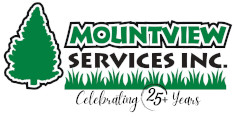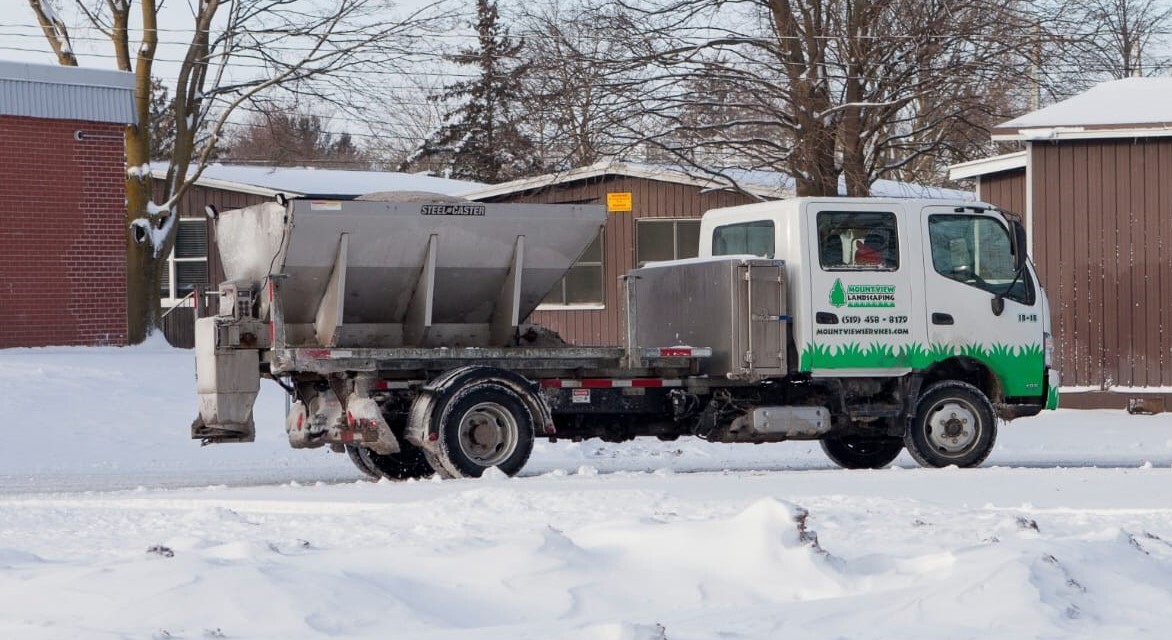Ice Melter for Canadian Winters
Winter in Southwestern Ontario brings its own set of challenges for homeowners and businesses aiming to keep pathways, driveways, and hardscaped areas safe and accessible. Choosing the correct ice melter can make all the difference in maintaining safety on your property while also protecting your lawn, garden, and hardscapes from the corrosive effects of ice melter products. With so many different types of ice melters to choose from, it’s hard to determine which ice melter is the right choice for the chosen application. When considering ice melters for your property, always read the label, review the safety information, and contact an expert if you are unsure.
Types of Ice Melters
Rock Salt (Sodium Chloride)
Rock Salt or Sodium Chloride is the most common type of ice melter and is used in large-scale applications for salting roads and large parking lots. Rock salt is an affordable and effective ice-melting solution that continues to melt ice at temperatures as low as -9°C. Prolonged use of rock salt on a residential property, however, can damage plants, lawns, and hardscapes like concrete and stone due to its corrosive properties and can also be harmful to pets. When used in residential applications, it is best for paved driveways and non-sensitive areas where cost-effectiveness is a priority.
Calcium Chloride
Calcium Chloride is a quick-acting ice melter that remains effective in extremely low temperatures (down to -29°C). This type of ice melter has proven to be less harmful to garden and lawn vegetation as well as hardscapes and concrete but has been shown to corrode metals and irritate skin. For residential applications, Calcium Chloride is a very useful ice melter for walkways of all substrates and areas requiring fast de-icing.
Magnesium Chloride
Magnesium Chloride is a gentler alternative ice melter that’s eco-friendly and safer for plants, pets, and walkway substrates like stone and concrete. Magnesium chloride is slightly more expensive than other options, but it is much less corrosive and more effective than sodium chloride. Magnesium Chloride is a great option for heavily landscaped areas and gardens where safety for plants is critical.
Potassium Chloride
Potassium Chloride ice melters are derived from fertilizers and have minimal environmental impact. This type of ice melter is, however, less effective in extremely cold temperatures (below -10°C). Potassium Chloride is a great option for snow and ice removal around or on Lawns, gardens, and areas near dense vegetation.
Liquid Ice Melters
For large-scale ice melting and ice-prevention requirements, the use of liquid ice melters is becoming increasingly popular. Liquid salt solutions or brines, as well as alternative solutions like beet juice, are effective ice removal and prevention solutions and help to reduce the amount of ice-melter consumption by providing more effective surface coverage. This not only reduces costs for businesses requiring snow removal but helps to maintain consistency in ice-free surfaces.
Brines (Salt Solutions)
Liquid salt or brine solutions are pre-applied to roads and walkways in anticipation of ice and snow build-up to prevent ice formation. These solutions adhere well to surfaces and provide more consistent overall coverage, reducing the need for solid salt later. Overall, brine solutions are cost-effective as they reduce salt usage and the need for re-application and provide proactive ice prevention. Equipment costs for the application of brine solutions, however, can be a barrier as specialized equipment is required to prevent overapplication, which can harm soil and plants. This type of ice-melting solution is great for large-scale preventative applications on parking lots, driveways and walkways.
Beet Juice Mixtures
Beet juice mixtures are often added to brines as an eco-friendly alternative that lowers the freezing point of water and enhances de-icing efficiency. These mixtures are fully biodegradable and pet-safe and can help to reduce salt usage by up to 30%. Beet juice mixtures are not applicable in all circumstances as they may leave a dark residue on lighter surfaces such as concrete, and the effectiveness varies with temperature.
Calcium-Magnesium Acetate (CMA)
Calcium-magnesium acetate is a liquid de-icer made from acetic acid (vinegar) and dolomitic lime. CMA is non-corrosive and environmentally friendly, making it safe for humans, pets and plants, and other vegetation. CMA is also great for hardscapes of all types due to its low corrosive properties and is also non-corrosive to metals, keeping vehicles corrosion-free. CMA is a higher-cost ice-melter and also slower acting, making it less popular for large-scale use in winter ice prevention.
Ice-Melter Safety Considerations
When using chemical mixtures or corrosive materials, it is always important to consider all aspects of safety, including the impact on humans, pets, and other animals, as well as the environment. When handling ice melters, both solid and liquid, always wear gloves to avoid skin irritation or other possible reactions. All ice-melting products should be stored securely to prevent accidental spills or access by children or animals.
Read the Label & Safety Information
The label, safety information, or MSDS is a great place to learn about the effectiveness and potential dangers of using a specific product. Each product may have pros and cons, and it’s essential to consider the primary application location and its surroundings. For residential homes, it’s best to choose kid and pet-friendly options that are labeled as safe for paws to prevent burns or irritation. Also, consider the vegetation adjacent to the area of application as well as the substrate to which it is to be applied. While most asphalt and pavements can handle a variety of salts and salt solutions, concretes and manufactured hardscapes may be more prone to the corrosive properties of ice melters.
Avoid Overuse
The most effective way to prevent ice and snow build-up is to be proactive. Monitor the conditions on a regular basis and remove snow using a shovel to prevent melting and refreezing, causing ice build-up. In many cases, despite the cold temperatures, a surface exposed to sunlight will warm up enough to remain ice-free. When conditions do require ice melters for prevention or removal, a little goes a long way. Pay attention to the amount of material used and stay consistent with coverage, applying evenly and in smaller quantities. Be precise with your application to avoid spreading ice-melters into your lawn or garden.
Choosing the right ice melter is crucial for maintaining safety and protecting your landscape during winter. Eco-friendly options like magnesium chloride, beet juice mixtures, and CMA offer effective and sustainable solutions. Mountview Landscaping has years of experience in snow and ice removal and always selects the best ice-melter for each application. If you need winter snow and ice removal services, contact Mountview today. Our team will keep your property safe and beautiful all season long.

